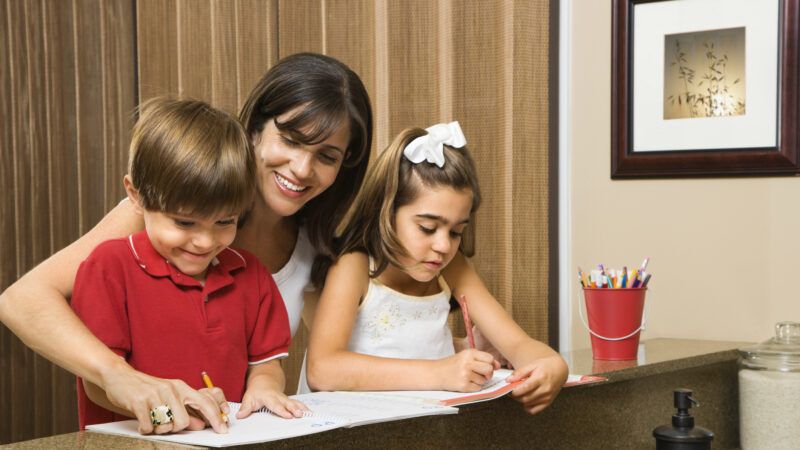New Jersey Lawmakers Are Considering 2 Bills To Heavily Regulate Homeschooling
Under the bills, homeschooling curricula would have to meet state learning standards and students would be required to complete annual wellness checks.

New Jersey has as many as 94,518 homeschooled students, according to 2022 data from the National Home Education Research Institute. A series of bills being considered by the New Jersey Legislature aim to heavily regulate homeschooling and restrict parents' and students' educational freedom in the state.
In June, Assemblyman Sterley S. Stanley (D–East Brunswick) introduced Assembly Bill 5825, which would require all homeschooling parents at the beginning of the school year to send a letter to the local school district's superintendent that includes the name and age of the student and the name of the instructor administering the home education program. Parents will also be mandated to share a copy of the homeschooling curriculum, "which shall be aligned with the New Jersey Student Learning Standards." In addition to setting requirements for mathematics and science, state learning standards require lesson plans to cover issues such as climate change and diversity, equity, and inclusion in K-12 classrooms.
The bill would also require supervisors of the homeschooling program to maintain a portfolio of student records, such as writing samples, worksheets, and reading lists. The portfolio, which is to be submitted to the district superintendent annually, must also include a written evaluation of the student's educational progress by a qualified evaluator. That person can be a licensed psychologist or teacher but not the student's parent or guardian.
New Jersey is one of 12 states that don't require families to check in with, obtain approval from, or file with the government to legally homeschool. Will Estrada, senior counsel at the Homeschool Legal Defense Association, tells Reason that no states currently require a homeschool curriculum to align with the public schools. Many parents, he adds, have pulled their children out of public school specifically because the public education system's one-size-fits-all approach doesn't work for their child's individualized needs.
New Jersey is also considering A.B. 5796. Introduced by Assemblyman Cody D. Miller (D–Turnersville) in June, the bill requires homeschooling families to annually meet with a public school official for a basic child welfare check.
While preventing abuse is a noble goal, lawmakers' concerns over the welfare of homeschoolers appear to be misguided. Estrada points to a 2022 peer-reviewed study that found homeschooled children do not face higher rates of abuse and neglect. The study incorporated nationally representative data from 1,253 "previously homeschooled and conventionally schooled (public and private schools) adults," who were asked to anonymously report about school-age experiences of abuse and neglect. The survey found that the type of school students go to "is a non-issue" in determining the likelihood of abuse "after considering the role played by demographics" such as family structure, years in foster care, large family size, and household poverty. The report's findings are supported by a 2017 study, which found that "legally homeschooled students are 40% less likely to die by child abuse or neglect than the average student nationally."
Estrada warns that the legislation, which does not include funding for schools to hire more staff, "would be an extra burden on public schools." Increasing responsibilities for the state's already-short-staffed schools is "a little ironic too, because the public schools are there to educate children enrolled in the public school, not to do health and wellness checks on children in the community at large," he says.
There are a million reasons why parents would want to homeschool their children, none of which should need government approval. Rather than harassing parents who wish to have more of a say in what their children are taught, New Jersey lawmakers could better serve the public by looking for ways to increase educational freedom in the state.


Show Comments (37)